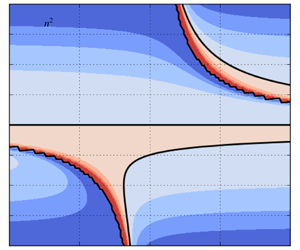Published online by Cambridge University Press: 07 January 2020

The aim of this study is to understand the dynamics of Rossby waves induced by a localised and periodic ‘plunger’ forcing – imposed on a background flow – which is intended as an elementary representation of transient mesoscale eddy forcing in the ocean. We consider linearised dynamics and its quasi-nonlinear extension, and focus on the rotating shallow-water model. The plunger induces a spectrum of Rossby waves that drive zonal momentum flux convergence at the forced latitudes. This behaviour has a robust and significant dependence on the background flow, which we treat as zonal and uniform. We systematically analyse this dependence using two methods. First, we use the eddy geometry formulation, in which Reynolds stresses are expressed in terms of eddy elongation and eddy tilt parameters, and consider the relationship between eddy geometry and zonal momentum redistribution. Second, we implement decompositions of flow responses into linear dynamical eigenmodes and compare with expectations from linear Rossby wave theory. Both methods compliment each other and aid the understanding of zonal momentum redistribution and its dependence on uniform background flow. We find that this dependence is determined by two factors: (i) dispersion-constrained resonance with the plunger forcing and (ii) efficiency of nonlinear eddy self-interactions. These results significantly improve our understanding of shallow-water Rossby waves, and may also be applied towards the development of parameterisations of oceanic mesoscale eddies.